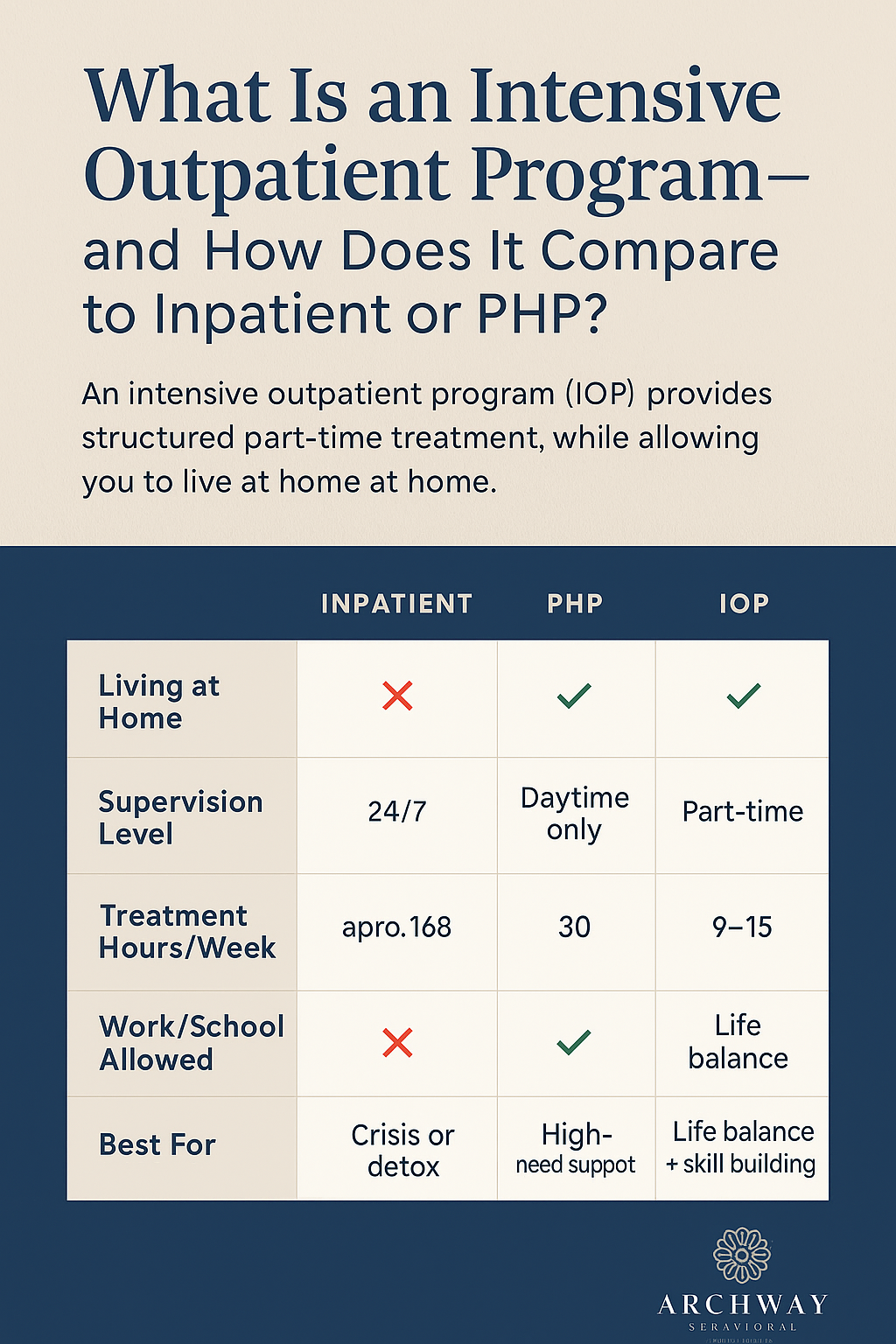When you’re considering therapy or treatment for the first time, it’s common to feel overwhelmed. You know you need help. You’ve started looking into options. But now you’re staring at acronyms—IOP, PHP, inpatient—and wondering how anyone is supposed to know what these mean or which one you need.
At Archway Behavioral Health in Boca Raton, Florida, we specialize in helping people take those first steps with clarity and compassion. We know this decision isn’t easy. You’re trying to picture what treatment will feel like—and how it will fit into your life. This blog will walk you through what an intensive outpatient program (IOP) is, how it compares to inpatient and PHP, and how to know what’s right for you.
What Is an Intensive Outpatient Program (IOP)?
An intensive outpatient program (IOP) is a structured form of therapy that provides more support than traditional one-hour-a-week counseling—but doesn’t require you to stay overnight in a facility. It’s designed for people who need regular, consistent support for their mental health or substance use issues but who are stable enough to live at home.
At Archway, our IOP typically includes:
- 9 to 15 hours of care per week
- 3 to 5 treatment days per week
- A combination of individual therapy, group therapy, and family counseling
- Skills-based learning like emotional regulation, coping strategies, and relapse prevention
- Morning or evening sessions to fit around work, school, or caregiving responsibilities
IOP helps you stay grounded in your real life while building the tools to manage it more effectively. You’re not isolated from the world—you’re learning how to navigate it with more strength, support, and clarity.
How Is IOP Different from Inpatient Treatment?
Inpatient treatment—sometimes called residential treatment—requires you to live full-time at a facility. That means 24-hour care, meals provided, no outside responsibilities, and typically no outside contact for a period of time. Inpatient is best for people who:
- Need detox or are medically unstable
- Are at high risk for self-harm or relapse
- Don’t have a safe or supportive environment at home
- Need to be removed from triggers to stabilize
IOP is different in a few key ways:
- You live at home, not at the facility
- You can work or go to school while attending treatment
- You’re responsible for managing your outside life with support, not isolation
IOP isn’t “less than” inpatient—it’s just different. It works best when you have some stability already, and when your focus is learning to apply recovery tools in everyday situations.
How Is IOP Different from PHP?
A Partial Hospitalization Program (PHP) is often the most intensive level of outpatient care. It’s designed for people who don’t need 24/7 monitoring but still need a full day of support. A typical PHP schedule is:
- 5 to 7 days per week
- Around 6 hours of treatment per day
- Structured like a school day with breaks and a lunch hour
In contrast, IOP is often 3 to 5 days per week for 3 to 4 hours per day. It’s ideal for someone who’s either stepping down from PHP or who needs substantial support but can manage some independence.
Quick Comparison: Inpatient vs. PHP vs. IOP
| Feature | Inpatient | PHP | IOP |
|---|---|---|---|
| Living at home | ❌ No | ✅ Yes | ✅ Yes |
| Supervision level | 24/7 | Daytime only | Part-time |
| Treatment hours/week | ~168 | ~30 | 9–15 |
| Work/school allowed | ❌ No | ❌ Often not | ✅ Yes |
| Best for | Crisis or detox | Transition or high-need support | Life balance + skill building |
Who Is IOP Best For?
IOP is ideal for people who need help—but who don’t need hospitalization. It might be your first formal step into treatment, or it might be where you land after inpatient or PHP.
You might be a good fit for IOP if:
- You’re struggling with anxiety, depression, substance use, or trauma
- You’ve tried therapy, but it wasn’t enough on its own
- You need more support—but not full-time care
- You want to build skills, process emotions, and stay connected to daily life
At Archway, we always do a full clinical assessment before recommending a level of care. It’s not about “fitting into a box”—it’s about making sure you get what you need without more disruption than necessary.
What Makes Archway’s IOP in Boca Raton Unique?
Many IOPs offer similar hours. But the quality of care—how it feels to walk through the doors, to speak in group, to sit in session—depends entirely on the people and philosophy behind the program.
At Archway, here’s what we focus on:
1. Personalized care
You’re not just another client on a schedule. Our small groups and one-on-one attention mean we get to know you—and adjust your care as your needs evolve.
2. Flexible scheduling
We know you have responsibilities. Our morning and evening programs make it easier to show up without putting your life on hold.
3. Local insight
We serve the Boca Raton community—and we know that healing happens when treatment feels connected, not distant or clinical.
4. A trauma-informed approach
We work from the understanding that many people seeking treatment are also carrying trauma. We create a space that is emotionally safe, not just clinically effective.
5. Real-life integration
We help you build the skills to handle stress, communicate clearly, and manage triggers in your actual life—not just in a therapy room.
Frequently Asked Questions
Is IOP covered by insurance?
Often, yes. Most private insurance plans offer coverage for intensive outpatient programs. At Archway, we can verify your benefits quickly and explain your options in plain language.
How long does IOP usually last?
Most programs last between 6 to 12 weeks, but the timeline depends on your needs and progress. Some clients stay longer; others step down to weekly therapy sooner. We’ll walk with you and adjust together.
Can I work while in IOP?
Yes, that’s one of the key advantages of IOP. Our flexible hours make it possible to keep your job, attend school, or manage caregiving while still getting serious support.
What if I’m not sure I need something this structured?
That’s a common concern. Many people start with IOP and realize it gives them the stability they didn’t know they were missing. The best way to find out is to talk with a counselor who can walk you through it without pressure.
Is IOP only for substance use?
Not at all. IOP is often used for mental health support too—especially for anxiety, depression, trauma, and emotional regulation. At Archway, we tailor our IOP programs to meet the specific needs of each client, whether substance-related or mental health-focused.
📞 Ready to Take That First Step?
You don’t have to figure it all out today. You don’t have to feel ready forever. You just have to be willing to talk it through.
Call Archway Behavioral Health at 888-488-4103 or learn more about our intensive outpatient program in Boca Raton.
We’re here to help you understand your options and move forward—at your pace, with real support.



